
An Interview With Dr. John Kaminski, Author of The Great Virginia Triumvirate
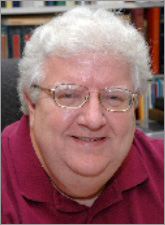 I recently had the distinct pleasure of speaking with Dr. John Kaminski, author of the recently published book, The Great Virginia Triumvirate.  Dr. Kaminski gave me nearly two hours of his valuable time and innumerable insights into the characters featured in his book, namely Washington, Jefferson and Madison.
I recently had the distinct pleasure of speaking with Dr. John Kaminski, author of the recently published book, The Great Virginia Triumvirate.  Dr. Kaminski gave me nearly two hours of his valuable time and innumerable insights into the characters featured in his book, namely Washington, Jefferson and Madison.
Please note, that Dr. Kaminski has reviewed the content of his remarks as I have captured them, (and found them acceptable), but that they are phrased in my vernacular. He is much more well spoken than am I! However, I type shorthand notes in the course of conducting these interviews and so cannot always reproduce what my victim has said word for word.
And now, on to the interview:
1. Background & Overview
Martin: Â I always like to give a little biographical data on the authors that I interview. Â I note that you are the founder and director of the Center for the Study of the American Constitution in the Department of History at the University of Wisconsin, Madison. Â How long have you had this post? Â Tell me about the organization and its work.
John:  I started working on documentary history  in 1969.  Dr. Merril Jensen was my predecessor,  and that time the project had been in progress for 10 years.   I took over in 1980 after  Dr. Jensen died.   This was at the same time when Reagan came in as president and there was a move to reduce funding.  Predictably, funding went away, so we determined that the focus had to expand in order to survive.  Education and outreach as well as publication of documentation was required in order to be able to bring in funding from other mechanisms.
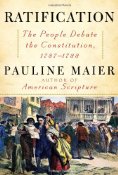 Martin:  I read somewhere that you are involved in a major project to gather together all of the surviving documents related to the ratification of the Constitution.  I think this is a project that so far has lasted 50 years with a resulting 19 volumes.  I am currently reading Pauline Maier’s book, Ratification and one of our other authors read and reviewed it.  Do you know Ms. Maier?  Can you tell me a little bit about that project?
Martin:  I read somewhere that you are involved in a major project to gather together all of the surviving documents related to the ratification of the Constitution.  I think this is a project that so far has lasted 50 years with a resulting 19 volumes.  I am currently reading Pauline Maier’s book, Ratification and one of our other authors read and reviewed it.  Do you know Ms. Maier?  Can you tell me a little bit about that project?
John:  The idea began in 1939, congress was considering appropriating money, but then Word War II came along, so this effort was delayed until 1950.  Then out came Jefferson’s papers.   President Truman was impressed, and so interest was reinvigorated. The Federal Commission named 50 individuals who they thought would warrant documenting.   Of these the government decided to sponsor 2 efforts, Ratification and the papers of the First Federal Congress.  They didn’t actually cough up dollars to support this. But employees of the National Archives came out to survey and collect documents.  Funding was secured privately by the Ford Foundation.  They worked for 10 years, and produced 1 volume.  Robert Cushman, who had just retired from Cornell University, was in charge.  His volume was rejected twice by the board.  He died shortly thereafter.   Merrill Jensen took over as editor in 1969. He got it out of the hands of the National Archives people.  At that time I was a grad student and joined the project, although it did somewhat delay my PHd, it was a heck of an opportunity.  I’ve been working on the project ever since, now for over 40 years.
I’m fond of pointing out that the framers of the Constitution took 4 months to put it together, the American people took 9 months to ratify it, but it will 65 years to document all of it.  These documents are all over the world.  It takes time to gather all these things. We work through one state at a time, and produce 1 or more volumes per state.
One thing that is nice about this is that we are making all of it available to scholars on line.
By the end of this year we will have 23 volumes completed. Â Additionally there are supplemental materials comprising another 15 – 20 volumes. Â Although we are not still actively collecting, each time we do a new state, we do a mop-up search.
With regard to Pauline Maier, Yes!  If you refer to her acknowledgments in the book, you’ll see that she credits us quite prominently.  We gave her material ahead of time, before it was published, in electronic form for New York state.   One of the scholars on this project, Richard Leffler, retired and then helped critique her work for 6 months.  Prior to retirement, he worked for 37 years on this project.  After retiring, he helped her for several months and is also credited in her book.
Martin:  What made you decide to specialize in the history of America’s founding?
John: I got interested in history in 4th grade.  I read a book on Southern American Culture.  Then in 6th grade I had a teacher who encouraged my interest, and gave me extra work.  I’ll never forget she had me write a paper on the causes of the American Revolution.  At that time I was hooked.
Martin: Â Do you still teach or are you solely devoted to research?
John:  I don’t teach anymore.  I have a research appointment since I retired after 41 years.  I am now a rehired annuitant.  My teaching is outreach now.  For instance I’ll be gone for the next 3 weeks, in D.C. where I’ll be teaching for 3 days, then Montpelier a couple times. …  I’ll be conducting multiple lectures to teachers, judges.  I speak with judges 7 -10 times per year.
2. On Writing The Great Virginia Triumvirate
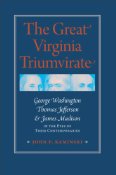 Martin: Â The next section of questions will pertain to the process of writing. Â I have a not-so-secret aspiration to one day attempt the process! Â And so I try to sneak in some questions of this sort with every author I speak with.
Martin: Â The next section of questions will pertain to the process of writing. Â I have a not-so-secret aspiration to one day attempt the process! Â And so I try to sneak in some questions of this sort with every author I speak with.
I really enjoyed The Great Virginia Triumvirate, by the way. Â I recently made trip to Washington on business and added a few days at the end to hit Montpelier, Monticello, and Mount Vernon, in addition to Gunston Hall and Ash Lawn/Highland. Â Your book was the perfect thing to read on the plane prior to visiting these places. Â What prompted you to write this particular book?
John:  It all started in 1990 when I approached a publisher and suggested that they might like to do a “little book†on Thomas Jefferson.   By “little book†I mean what Thomas Jefferson would call a commonplace book – it’s 2×2 inch book A-Z.  They agreed, so I started to collect the quotations for Jefferson.  Out of that came a book called Citizen Jefferson, Citizen Paine, then a book on John Jay.  John Adams was different in that he couldn’t stop talking about himself … and other people.  After 7 volumes I gave up on this tack, and went to the Founders on the Founders.   After about 10 years I had about 7000 pages.  I finally published a book covering a fraction of this, about 30 people (out of the more than 400 in my database).
Then I thought about doing chapbooks.  The University of  Wisconsin library had a press called Parallel Press.  A colleague by the name of Ken Fraser asked for a biography with these materials.  The first couple of books came in too long for the chapbooks idea, but they were amenable to publishing them anyway.  I went to the University of Virginia and they went for the idea, although they cut out Lafayette.
Martin: Â Â In this day and age of online accessibility of so many interesting sources, how much archive/library time was required?
John:   Primarily what I used was documentary editions.  When I did the collecting of the Founders on the Founders, people liked it. The reason it wasn’t done before was because you need a significant volume of material.  The handwriting is difficult and time consuming.   So I could rely on the expertise of the editors in transcribing the documents!  I’ve also gone back to the 19th century editions.  I’ve been through probably over 1000 volumes.  These aren’t indexed!  I still go through these when new volumes come out.
By the way, eventually my entire database will go on the University of  Wisconsin’s website.  There is over 7000 pages of material describing 430 people.
In the database I have varying numbers of quotations.  Some founders have more and some less.  I’ve found that if you have around 50 quotations, it amounts to a decent mosaic.  I’m back to working on John Adams.
Martin: Â Did you visit Montpelier, Monticello, and Mount Vernon in preparation for this book? Â If so, how does that work? Â Do they assign curator staff to help? Â What resources are available for researchers?
John: I usually don’t do research there.  My research is usually done here in WI.  The historical society is right across the street is probably the best library in the world for American History.  The library of congress is great but congressmen often fail to return the books!  We have a phenomenal collection at the historical society.  They have virtually all of the documentary editions, I either purchase them outright, or use their materials.
Martin:  What did you leave out of this book that wished you had been able to fit in?  It’s been my experience in talking with authors that there is always something that has to be chopped for one reason or another, or something that just doesn’t fit, but that was an interesting discovery, nonetheless.  What was that?
John: I certainly had to cut my analysis of their presidencies considerably.  I had to just hit on the high spots.  When you’re limited to 100 pages, there is no way I could talk in depth.  I summarized as best as I could.  This contrasts with someone like Dumas Malone, who was able to devote 6 volumes to Jefferson.   I like to let them speak in their own words.  I mix narrative with quotations and commentaries and vignettes.   Overall I’m fairly satisfied.   With Washington, there is so much…  You end up with, let’s say, with Jefferson.  I might have 10 items that speak to one aspect, I use 2 or 3.  That way the subject matter is covered, but just not as comprehensively as if I was writing a full fledged biography.
Martin: Â Were there any interesting connections that you discovered in the course of writing this book that were a surprise to you? Â I wonder at the depth of information that remains, even when someone has been at a course of study for a long time.
John: Oh yes!  I know when I first came out with my book Citizen Jefferson.  We had a dinner that I spoke at.  One of my friends said that it was a book that only I could do.  I didn’t think much of that.  But then I have come to believe that there might be something to that.  There is a certain aptitude for finding the particular quotations.  It’s like there’s a huge forest and you have to find the trees among them.  My friend Richard Leffler said once of me that I have the ability to see things that other people don’t.  My role as a documentary editor has really helped.  It brings new insights.
So, for instance, looking at James Madison.  I don’t know that anyone realizes that Madison wrote the Act authorizing the appointment of the Virginia delegates to the constitutional convention.  This was reprinted in every single state in the country.  it set the emotional state getting the people willing to accept what the convention will come up with.  He sets the stage. This was in November 1786. He used the same language that Thomas Paine used, the Declaration, and Washington’s last circular to the states, and a number of key contemporaneous documents.  I don’t know that many people understand the significance of that one particular document.
3. Founder Personalities
Martin: In this section I’d like to ask you a little about personalities and relationships between the  men we know as the country’s founders.
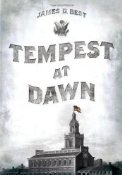 One of our writers at WWTFT is a heck of nice guy by the name of James Best. He has written a novel about the Constitutional Convention, entitled Tempest at Dawn.  In his book James describes how scrupulous and careful Madison was in making sure he captured the events of the convention.  I read an article entitled Madison’s Gift, recently that remarked on the consistency on Madison’s early notes with those he revised later.
One of our writers at WWTFT is a heck of nice guy by the name of James Best. He has written a novel about the Constitutional Convention, entitled Tempest at Dawn.  In his book James describes how scrupulous and careful Madison was in making sure he captured the events of the convention.  I read an article entitled Madison’s Gift, recently that remarked on the consistency on Madison’s early notes with those he revised later.
After examining all of the changes, the editors of the modern edition of Madison’s papers maintain that the later additions made by Madison “were motivated by an earnest desire for completeness and accuracy”
However, there is an omission in these notes that Mr. Best has some fun with in his book. Â That is the fact that there is absolutely no mention of the proposal made by Charles Pinckney. Â This would seem to indicate that Madison had some antipathy towards Pinckney. Have you come across anything to support this?
John: Â Yes, in fact, Pinckney published a pamphlet after the convention describing his proposal. Â Madison sent it to Washington and denigrated it.
I think that if Madison had had his choice, he would have been a history professor. Â He wrote his notes for someone like me.
William Pierce wrote descriptions of the delegates. His work was first published in 1901.  Rich Leffler and I are working on editing his original manuscript.  In that, Pierce describes Madison as the scholar and politician.
When you went up against Madison in debate, what he said in his opening remarks would amount to maybe 10% of what he knew. Â He was saving the rest for ammunition!
Martin: The Great Virginia Triumvirate covers both Madison and Jefferson.  In researching these men did you discover any difference in Madison’s behavior when Jefferson was in country and when he was out of the country?  Madison played a critical role in the Constitutional Convention, while Jefferson was in France.  Jefferson was not entirely sure of the result.  Would you care to speculate on how things might have been different had Jefferson been in situ?
John:  Yes.  In fact, I think I am a minority of one in this regard.  I believe that if John Adams and Thomas Jefferson had been in the country and not abroad, Jefferson would not have allowed the Constitution to leave the convention without a bill of rights.  Both of these men were great legislators, committeemen.  They were in their prime, at the height of their powers.  In 1787 they weren’t so partisan or obstructionist.  Madison would not have been as significant and would have deferred more to Jefferson.  Adams, while he wasn’t there, was there in spirit with his work on the Massachusetts constitution, his work Defense of American Constitutions, etc.
It’s easy to propose a bill of rights, Mason said he could have done in matter of hours.  The problem was that it might have resulted in unraveling the whole thing with debate.  The issue of slavery was a big underlying problem.  For example, Charles Cotesworth Pinckney talks about William Cushing in Massachusetts*.  That’s the reason he gave to his constituents for their absence – Bill of rights usually prefaced with the statement that all men are created equal.
Martin: Madison is a bit of an enigma to me, and probably a lot of people. Â He seems to have started out as a Federalist and morphed into a Republican. Â What kind of relationship did he have with George Washington? Â Did it change after the Constitutional Convention? Â If so, why?
John: Â My interpretation of Madison is that he is consistent throughout. Â He is the champion of liberty and justice. Â Wherever the rights of individuals are challenged, he is on the side of individuals. Â He is always concerned with liberty.
In his book, Founding Friendship by Stuart Liebiger, he makes the point that salutations are important clues.  For example, Sir vs. Dear Sir vs. My Dear Sir.  It’s hard for Madison to be so familiar with Washington.  They were definitely friends in the 1780’s.  It’s Madison that gets Washington to go to the convention.  He played a critical role.
Madison later became Washington’s unofficial protocol secretary.  Washington realized the importance of precedent.  Madison gave the answers.
The falling out occurs 2-3 years into the presidency. Â Washington fell under the influence of Hamilton. Â Madison and Jefferson never forget they are Virginians, but while Washington was a Virginian, he holds more of a national view.
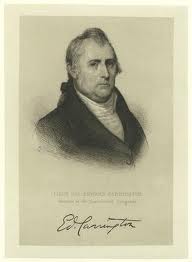 There is an interesting letter from Hamilton letter to Edward Carrington.  Carrington took Madison’s place in Congress when Madison’s term limit was up.   Carrington was also the first US Marshal for VA, appointed by Washington.  Hamilton wrote him a very long letter lamenting “how I lost my Madison!† They weren’t quite as close as he thought.  What many people don’t realized is that they actually differed in some cases on writing the Federalist, which was their ultimate source of estrangement, their interpretations of the Constitution.
There is an interesting letter from Hamilton letter to Edward Carrington.  Carrington took Madison’s place in Congress when Madison’s term limit was up.   Carrington was also the first US Marshal for VA, appointed by Washington.  Hamilton wrote him a very long letter lamenting “how I lost my Madison!† They weren’t quite as close as he thought.  What many people don’t realized is that they actually differed in some cases on writing the Federalist, which was their ultimate source of estrangement, their interpretations of the Constitution.
In comparing Jefferson and Madison’s relationship with Washington,  Martha the widow remarks on disappointment with Jefferson’s behavior toward her husband, but does not do so with Madison.
Martin: Washington doesn’t always seem to get his due with regard to his intellectual powers.  I recently read a book by Carlos Cruz O’Brien which sheds light on Washington’s outmaneuvering of Jefferson at just about every turn.  In particular in his use of Hamilton and others to pursue rapprochement with the British without Jefferson’s knowledge – even though Jefferson was Secretary of State.  He was similarly bamboozled in the “trade†for the location of the capitol, in exchange for the votes needed for the assumption of state debts.  What’s your take on their relationship?  Who got the better of whom?
John: I think they both “won†on the capitol as did Madison.  The placement is another interesting thing you might want to look into at some point.  George Washington moved it from it’s location and this caused quite a stir….
But, back to the question, Jefferson said that he was not a mind of the first order.  He didn’t have the philosophical bent.  This was a good thing.  The country needed a man of action.  He stuck to what was right.  Abigail Adams said it was a good thing that he was a good man, because he had the ability to make people do what he wanted.
Washington surrounded himself with great men.  He wasn’t afraid of that.  He saw Hamilton and Jefferson as childish.  Their disagreements over the French revolution were very strong. There is a continuum between anarchy and despotism and a variety of points on the line between.
There is a continuum, too little power in the government  and you have anarchy, then someone will show up as a  knight in shining armor, and turn into a despot in his own right.  On the other side of the spectrum is direct despotism. The Hamiltonian view in Jefferson’s mind was just this, too much power which would lead directly to despotism.
Hamilton indulged in his fair share of dirty tricks.  There is a book called Number 7 by Julian Boyd.  Number 7 was George Beckwith’s code number for Hamilton.  There’s a story of how, when Hamilton did not agree with the appointment of Gouverneur Morris as special minister to Britain, he planted seeds of dissent.  Hamilton went to Beckwith and asked if he’d heard that Morris was intriguing with the opposition.  Then Hamilton then quibbled, claiming he’d had a conversation with Beckwith about Morris’s intrigues!
But I do think that Washington has been often underrated.  He was definitely his own man.  I regularly give a presentation to judges on “how to pick†a judge.  I use the first 4 presidents as examples.  Washington would sound out the senators for their advice.  Washington, as Jefferson said, was almost infallible when he would consider questions at a liesurely pace.
On Constitutional matters Madison didn’t want a strict interpretation as much as he wanted a liberal or natural construction.  He believed that Hamilton wanted a forced construction.
Martin:  I’ve recently read a couple books that deal with time period about the War of 1812.  One was Harlow Giles Unger’s biography of James Monroe, and the other is by Anthony Pitch, entitled, The Burning of Washington.  Unger has some definite opinions about Madison as a President.  Pitch was a little more circumspect in his presentation, but basically in accord.  What is your take on Madison as a President?
John:  Madison was basically was president for 10 years.   Jefferson was a lame duck for his last two years and didn’t do much. Jefferson’s policies were Madison’s policies.   He attempted to stay out of war.  But, what worked in the 1760’s didn’t work so well in the 18 teens.    They were trying to keep the nation out of war because of the financial situation.    Staying out of war was his foremost goal.
Madison’s critics say he suffered from timidity.  They say that this is just as bad as being tyrannical.
You have to understand the sectionalism and division of the country. Â Economically the North was very tied to Britain.
Speaking of Harlow, he is a good friend of mine. Â I reviewed his biography of Patrick Henry for him and he dedicated it to me.
How you look at Madison depends on your perspective. Biographers tend to fall in love with their subjects and become hostile to opponents of their subjects.  I think it’s important to have empathy without falling in love with your subject, but perhaps understand and empathize with their opponents.  If you’re not careful you end up with simplistic story.  It’s not black, white, beige or gray.  It’s more like a Jackson Pollack.
Madison went from being very unpopular (they intruded a lot at the state level), especially the New England states. Â It is questionable whether the policies of Madison and Jefferson might have been more successful had the New-Englanders been more cooperative, engaged in less smuggling, etc.
In the end, Madison becomes a hero. Â He was tremendously popular after the war was concluded.
4. The Usual Questions
Martin: Thanks so much for your time, we’re almost done!  I have to admit.  I really admire Jefferson’s writing, but he’s not been one of my favorite founders.  I’d like a recommendation for a fair, non-hagiographic biography of Jefferson.
John: Â Norman Risjord has written a short biography as has Richard Bernstein.
Martin: Which questions do you normally get asked, that I neglected to ask? Â What did I miss?
John: Â Everyone always asks what would the founding fathers think today if they came back. Â This is an impossible question. Â Change is so accelerated today. Â There is no way in the world that we can postulate.
I’ve given lectures on communications and travel – the differences are astounding.  Population of country 3 million vs 300 million.
Martin :  You’re not suggesting that the larger issues like those of character and principle don’t translate to today?
John: No.  Jefferson provides an example in Tripoli and his views of how to approach struggling people and recognize them.  You’ll note that he didn’t want to send in overwhelming force, but just enough to get the job done.
Martin: What is your next project?
John: I am currently writing about 5 different books.  One is a study of death and the founders.  Another is a book called 1786.  It was the year that precipitated a constitutional revolution.  It delves into what had to happen and what might have happened had some things not occurred. Then there is the short bio of John Adams.  And then there’s one on the French attitude of Americans in 1774-89.   Despite French historians’ insistence of their revolution’s uniqueness, the American revolution had to have had a great influence on them, if for no other reason than having so many return from the American campaigns to France.
Martin: Thank you very much for your time. May I follow up via email if I have followup questions?
John:Â Yes, certainly.
*In 1783, Cushing presided over a criminal action in Worcester that effectively abolished slavery in the Commonwealth of Massachusetts. Part of Cushing’s charge to the jury was a recitation of a part of the 1780 Massachusetts Constitution, which declared “all men are born free and equal.” Â — http://www.michaelariens.com/ConLaw/justices/cushing.htm
 The posts are coming!
The posts are coming!

2 comments
Wonderful interview. Thanks for the plug.
[Reply]
It looks very well proofread. 🙂
[Reply]
Leave a Comment